- Home
- Kruger, Mary
Gifts of the Heart
Gifts of the Heart Read online
Gifts of the Heart
Mary Kruger
Smashwords Edition
Copyright 2011 Mary Kruger
Smashwords Edition, License Notes
This ebook is licensed for your personal enjoyment only. This ebook may not be re-sold or given away to other people. If you would like to share this book with another person, please purchase an additional copy for each recipient. If you’re reading this book and did not purchase it, or it was not purchased for your use only, then please return to Smashwords.com and purchase your own copy. Thank you for respecting the hard work of this author.
Cover design copyright 2011 by Princess Pages.
For Samantha
Chapter One
Robert Evans, the Marquess of Stowe, glanced out the window of the traveling carriage and then reached up to grasp the strap, bracing himself for the sharp downhill turn into the drive. Stowcroft, at last. It had been a long, weary trip from London to Devon, though the roads were in good shape and the weather was fine. His own impatience was what had made the trip so long. Never had Robert wished so much to be home. Never had he needed it quite so much.
The carriage swept past the lodge, where the gatekeeper rushed out, tugging at his forelock. Beside him his wife, still wiping her hands on her apron, dropped into a hasty curtsy. News of Robert’s homecoming hadn’t reached here, then, though he hadn’t really expected it to. He had made his decision to return too quickly to send a letter ahead. Eliza would be surprised to see him. Surprised, and glad? Lord, he hoped so. He found himself leaning forward, as if to hurry the carriage along. He needed to see Eliza again. He needed to confirm, despite the hint in his sister’s last letter, that she was well. Eliza was, quite simply, all he had.
He knew it didn’t seem that way to the outside world. His pedigree was long and his estates, if not vast, healthy. He took his seat in Parliament every year and enjoyed a position of influence in the Whig party. He would have been a supremely happy man, had Eliza ever bothered to come to London with him. Instead, she chose to stay behind at Stowcroft with their children, whom she claimed needed her more than he. It was an old argument, one he no longer fought, though now that Laura, their youngest, was nine, he hoped things would change. He was tired of living away from his wife.
The carriage dipped into a sun-dappled glade, the wheels rumbling briefly over the planks of a bridge, and then emerged again into sunlight. Before him was the house, a comfortable Elizabethan manor of gray stone, set on a plateau of emerald green turf that led to a cliff. Beyond was the shining sea, sparkling in the sun. He was home.
As the carriage drew up under the portico, a footman raced to open the door for him. Robert descended and strode into the house, past a startled-looking Shannon, the butler, and the curtsying maids. “Welcome home, me lord.” Shannon followed after him, grinning. Hiring him had been Eliza’s notion, a butler who performed his duties impeccably, but with the Irish tendency toward song and irreverence. Robert still wasn’t quite accustomed to him, after ten years. “And fine it is to have ye here, me lord. Will ye be wanting refreshment? Or will ye be going to your rooms to bathe?”
“Neither,” Robert said crisply, thrusting both hat and stick at him. “Where is Lady Stowe?”
“Why, in the garden, me lord. Where else would she be?” Surprise showed for a moment in the bright blue eyes, and then something else, an expression Robert couldn’t identify. “Sure, and glad she’ll be to see ye. She’s—”
“Thank you, Shannon,” Robert said, cutting him off, and turned away. He was never certain whether to upbraid the man for his impudence, or to return his cheerful smile. This house was certainly run differently than it had been in his parents’ day, a fact which his mother, on her infrequent visits, lamented. Robert liked the informality, even if it did sometimes make him uncomfortable.
From hall to antechamber to drawing room Robert strode, again looking neither to right nor left and so ignoring the rare Grinling Gibbons carvings in the hall and the exquisite Adam mantelpiece in the drawing room. The quickest way out to the garden was by the French windows that opened off the drawing room. So intent was he on his destination that he didn’t notice the figures gathered on the terrace, until he heard voices. “Father!” someone gasped, and he turned, startled, to see his daughters with their governess.
Good lord, they had grown. Though he had just seen them at Christmastime, both girls seemed to have added inches to their heights. In addition Delia, the oldest of his children at fourteen, no longer had the shape of a little girl. The thought gave him a pang. “Delia. Laura.” Smiling, he walked toward them. They continued to stare at him, their eyes wide and startled, and then dropped into curtsies. Something twisted inside Robert. In the past Laura had always run to him, to be hugged and to tell him all her news. Now she, like her sister, was holding back. “Have you been behaving yourselves?”
Delia’s eyes were downcast. “Yes, Father.”
Damn, he hadn’t meant to say such a thing. “You’ve grown.”
“Yes, Father.”
“Papa.” Laura, no longer able to contain herself, danced about in front of him. “My garden is ever so much bigger this year, and the carrot tops are showing already!” She threw herself at him, and he gathered the small body close, some of his tension dissipating. “Everything’s growing! Want to come see?”
“Not just now, muffin.” He smiled down at her, to take the sting out of his refusal, and was rewarded with a blazing smile of her own. “Perhaps later. I need to see your mother. Where is she, do you know?”
“In the rose garden, father.” Delia hung back, and the impulse to embrace her as well faded. She always had been more reserved, and more difficult, than her sister. “Will you be staying long?”
“For a time. I will see you at dinner.”
“Yes, Father.”
“Yes, Papa.”
He bowed, and turned away. Lord, he’d made a mull of that, with Delia. When had his children grown up? It seemed just yesterday they’d been babies, yet Delia was practically a young lady. Time was passing uncomfortably fast. Yet, what could he have said to them? Faced with their startled, wary looks, he had realized he was a stranger to them. An unwelcome stranger. Just so had he once looked at his own father. Until now he would have said he’d had nothing in common with that august personage. Now he wondered.
He heard Eliza before he saw her; she was humming a country air, apparently unaware of his presence and just as apparently at peace with the world. Something inside Robert relaxed. She wasn’t ill, then. Thank God. Only now did he admit to himself how worried he had been about her, and how scared. Life without Eliza, even if he did live apart from her, was too frightening a prospect to contemplate.
He turned past the yew hedge that sheltered the garden, and there she was, her back to him as she checked the leaves of the rose bushes for insects. Over her arm hung a flat basket filled with a riot of color, yellow daffodils and orange jonquils, purple iris and blue narcissus. As always she was dressed with little regard to fashion or convention, in a sack dress of some subdued color, with a battered straw hat upon her head. That last made him smile. She wasn’t a beauty, his Eliza, at least, not in the conventional way. Her light brown hair was too fine and soft to style neatly, her mouth a bit too wide for beauty, her chin a bit too square and determined. Her eyes, though, mirrored the depths of the sea, sometimes a serene aqua, sometimes a stormy gray, depths that had drawn him in long ago; and he had always been entranced by the petal softness of her fair skin. Unfortunately she tended to freckle; hence, the hat. He could remember one night, when they were first married, when he had kissed every one of her freckles...
“Ahem.” He cleared his throat, uncomfortable with that line of though
t.
Eliza turned, her eyes inquiring, the basket held across her body. “Robert!” she exclaimed, joy lighting her eyes to a clear blue. “You’re home!”
Robert inclined his head. “As you see, madam.”
“Oh, how wonderful—isn’t it?” She took a step forward and stopped, reminding him too clearly of Laura’s reluctance to greet him. “Is all well?”
“Yes. Why wouldn’t it be?”
“Because you rarely return home before Parliament finishes session.”
“We were accomplishing little. It’s been a difficult year.”
“Oh.” Eliza bent her head, examining a rose leaf. “No sign of aphids yet, thank goodness.”
“Good,” he said meaninglessly. “Eliza, you are well?”
She glanced up, surprise crossing her features at the concern in his voice. “Of course I am. Why do you ask?”
“I had heard—never mind, it hardly matters now.”
“Have you seen the girls?”
“Yes, just now.” He held out his hand. “Come, talk with me and tell me what’s been happening.”
Eliza hesitated for a moment, an odd look on her face, and then nodded. “Very well,” she said, lowering the basket. For the first time he saw what the basket had concealed, the fullness of her breasts, her softly rounded stomach. There was no mistaking the signs. Eliza was pregnant.
Chapter Two
They stared at each other across a tangle of glossy dark green leaves, as effective a barrier as a thorn hedge. “Well,” Robert said, not moving. “Were you planning on telling me?”
“Yes, of course I was.” Eliza walked sedately toward him, the impulse she’d felt to dash into his arms like a giddy girl quelled by the look on his face. “When you came home.”
He inclined his head. “As I have, madam.”
Unexpectedly Eliza felt the old familiar prickle of annoyance. Must he be so cool, so imperturbable? Once she’d been attracted to him precisely because of such coolness, his ability to handle everything thrown at him. More than once she had needed his calm steadiness to counterbalance her own flights of emotion. But must he never show any feelings? Here he had just learned he was to be a father again, and they might have been discussing the weather, for all he cared. If he cared. “It’s your child,” she said, aggressively.
Robert’s eyebrows went up in mild surprise. “I never thought otherwise, Eliza. I know you wouldn’t play me false.”
“No matter my other faults?”
“Why are you cutting up at me so?” he asked. “Have I done aught to upset you?”
No. You only stayed away for four months. And that, she should be accustomed to. “No, of course not. Forgive me, Robert. You know when I am increasing I am subject to megrims.”
“Mm-hm.” The look he cast her seemed to say she was subject to megrims most of the time, which, she admitted, was true. At least where he was concerned. “Are you feeling well?”
“Yes, quite well. Oh, Robert, I am glad you’re home.” At last she went to him, putting her hand on his arm and smiling up at him.
For a moment Robert stood still under her touch, and then pulled back, though he was smiling. Eliza felt again the familiar pang of disappointment and hurt. She should have expected it, should be used to it by now, but Robert’s coolness always hurt and surprised her. She should know better than to make the first move, yet she always did, despite the risk of rejection. Someone had to bridge the gap between them. From long experience, she knew it wouldn’t be him.
“It’s warm,” he said abruptly, and held out his arm. “You should be resting. As I recall, you’re usually tired by this time of day.”
Suddenly Eliza had to stifle a yawn. It was true, when she was increasing she did rest in the afternoon. Imagine him remembering that. “I’d like to rest,” she admitted, and laid her hand on his arm, grateful for its strength. Whatever else she said about Robert, he’d always been there for her to lean on. “Will you be home for a while?”
“I don’t know. I don’t seem to be needed in Parliament just now.”
Eliza’s eyes opened wide. “Why? What happened?”
“Nothing in particular. I don’t happen to agree with the government’s policies. Or, for that matter, my own party’s.”
“And they’re not listening to you? Oh, Robert, when they know how often you’ve been right in the past—”
“It matters not.” He looked down at her, his gaze suddenly sharp and keen. “It was Twelfth Night, wasn’t it?”
She didn’t pretend to misunderstand. Twelfth Night, the last time she and Robert had lain together, after the ball they had given. The night her child was conceived. “Yes.”
“Damn.” It was a measure of his agitation that he swore in her presence. “My apologies, Eliza,” he said, formally, as they reached the terrace. “It will not happen again.”
Eliza opened her mouth to speak, but at that moment a childish voice from the other side of the terrace distracted her. “Mama! Did you see my garden?” Laura cried, running up to her.
“Yes, Laura, I did.” She smiled, but inside she was annoyed, which startled her. She loved her children and loved being a mother to them. There was more to her than that, though. Before the children had come along she had been Robert’s wife. She always would be.
“I’ll leave you now, madam,” Robert said with a slight smile, and gently pulled away.
Eliza turned. There was still so much to discuss. “But, Robert—”
“As you see, I need to wash the dirt of the road from me. You will excuse me?”
“Yes, of course.” Eliza watched him as he left, a slight frown puckering her brow. It was going to be difficult this time. Very difficult.
“Mama?” Laura said, breaking into her thoughts. “Is Papa going to stay this time?”
Eliza forced herself to smile. “I hope so, Laura. Now. Let’s go see how your garden is doing,” she said, and turned away.
Laura bounced into the schoolroom, where Delia sat, half-heartedly working on her sampler. “I’m so glad Papa’s home!” she announced, throwing herself down onto the window seat. “Do you think he’ll want to see my garden?”
Delia looked over the top of her sampler. “I’m tired of hearing about your garden. And your dress is dirty.”
Laura glanced down at the hem of her blue muslin dress, which was indeed smudged with dirt, and shrugged. “Mama says that happens when you work in a garden. I think Papa might stay this time,” she said, kicking her heels back against the window seat.
“You’re such a baby,” Delia said scornfully. “He won’t stay. He doesn’t like it here.”
“I am not a baby! And he does so like it here.”
“Girls,” Miss Stevenson, their governess, said from her seat at the table, where she was going over their lessons. “Quietly, now.”
Delia and Laura cast her furtive glances, and then ignored her. “I’m not a baby!” Laura hissed. “Papa likes me.”
“Why isn’t he ever here, then?” Delia hissed back.
“Because he’s busy in London. Mama says he’s—”
“Too busy to be with us.”
That stopped Laura for a moment. In the darkest moments of the night, she sometimes wondered why Papa stayed away. Was it something she’d done? She tried to behave, really, she did, but when he was home she always did something that made him mad. He didn’t yell, not the way Mama did, but instead lowered his voice, which somehow was worse. And he had a way of looking at one, so steady and direct, that one just had to squirm. She’d be a good girl, Laura vowed once again. “You just don’t want him to know you like Michael Slocum.”
Delia’s head jerked up. “Don’t you tell him, you brat! Or I’ll—”
“Heavens, what is going on in here?” Eliza said from the doorway. Both girls froze, and then relaxed, at the mildness of her tone. “Are you squabbling again?”
“No.”
“No.”
Eliza exchanged a wry smile with Mis
s Stevenson and sank down next to Laura, stretching out her legs. “‘Tis a hot one today. What are you fighting about?”
“Nothing,” Laura muttered.
Eliza glanced down at her and then looked over her head at Delia. Delia worried her sometimes. She always had kept herself to herself, but lately she did so more tenaciously. She was growing up, Eliza acknowledged with an inward sigh, and yet now, with her eyes seeking Eliza’s for reassurance, she looked very young. “Delia?” she said, quietly.
Delia shook her head and looked down at her sampler. “Nothing, Mama,” she said, and then went on to give the lie to her words. “Does he know about Michael?”
“Your father? No, I don’t imagine so.” Eliza bit back a smile, relieved at the mildness of this problem. Delia was in the midst of her first romance, with Sir Peter Slocum’s son, and was taking it very seriously, more seriously than Eliza thought it warranted. Michael was, after all, not much older than Delia. She couldn’t imagine Robert playing the heavy-handed father over this. “Shall I tell him?”
“No! I mean, yes, well—”
“Trust me, Delia.” Eliza leaned past Laura to lay her hand on Delia’s. “He’ll find out anyway, and better it comes from us. He wants you to be happy.”
“Then why is he never here?” Delia burst out.
“He’s very busy in London,” Eliza said, the words sounding hollow even to herself. “I’m going to take a rest. Laura, do change your dress.”
“Yes, Mama,” Laura said, sounding so subdued that Eliza looked at her quickly. Both girls were sitting still, their heads bent. Eliza could only guess at their confusion. If it were like hers, they were unhappy, indeed.
“It will be all right.” She bent and put her arms about them, drawing them close. “I promise it will be all right.”
Both girls held on for a moment, and then Delia drew away. “Yes, Mama.”
“Good.” Eliza patted Laura’s shoulder and pulled back, smiling at both girls. “Mind Miss Stevenson, now,” she said, and went out.
By evening matters hadn’t improved. Robert seemed ill-at-ease at dining en famille, while the girls clearly were unsure how to react. When dinner was over and Eliza at last sought her bed, her head was aching. Drat Robert, anyway! Had he no idea of what his unexpected, whirlwind visits did to his family? It hadn’t been so bad when the children were young; they had accepted that their father had to be away. Now, though, as they grew older, they questioned his absences, and Eliza had no easy answers for them. Or for herself. Once she had sworn that her marriage would not be a typical ton marriage, like that of her parents’ and of so many others she knew. Her marriage was going to be different. How young she’d been, and how wrong. And what could she do about it now?

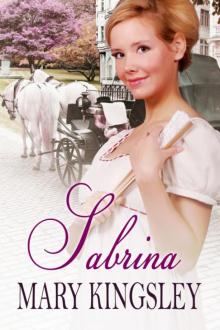 Sabrina
Sabrina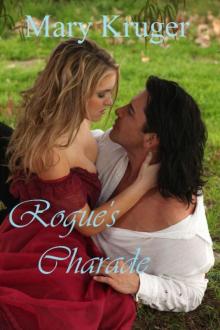 Rogue's Charade
Rogue's Charade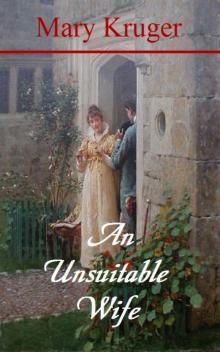 Unsuitable Wife
Unsuitable Wife In a Pirate's Arms
In a Pirate's Arms Crystal Heart
Crystal Heart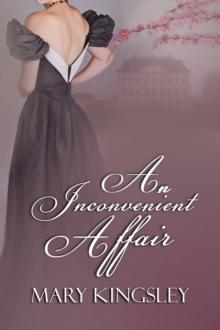 Inconvenient Affair
Inconvenient Affair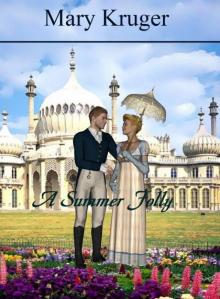 Summer Folly
Summer Folly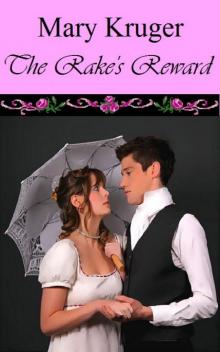 Rake's Reward
Rake's Reward Gifts of the Heart
Gifts of the Heart